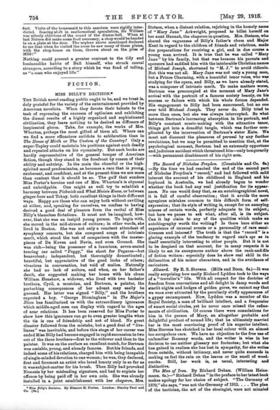FICTION.
MISS BILLY'S DECISION!
THE British novel-reading public ought to be, and we trust is, duly grateful for the variety of the entertainment provided by American novelists. When they devote their talents to the task of repressing the excesses of optimism and exhibiting the dismal results of a highly organized and sophisticated civilization, they leave nothing to be desired as diffusers of inepissated gloom. Take, for example, the works of Mrs. Wharton, perhaps the most gifted of them all Where can we find a more efficacious antidote to exhilaration than in The House of Mirth or The Custom of the Country? Only a super-Tapley could maintain his positions against such deadly and repeated attacks on his equanimity. But such books are hardly representative of the general temper of American fiction, though they stand in the forefront by reason of their ability and subtlety. In the main the cheerful or the high- spirited mood predominates, as becomes a race that is young, exuberant, and confident, and at the present time we are more than content that it should be so. The gulf that sunders Miss Porter's heroine and one of Mrs. Wharton's is abysmal and unbridgable. One might as well try to establish a harmony between Pickwick and What Maisie Knew, or between ginger-beer and Tokay, both excellent things in their different ways. Happy are those who can enjoy both without cavilling at either, and, speaking for ourselves, we confess to having derived a good deal of pleasure from the recital of Miss Billy's blameless flirtations. It must not be imagined, how- ever, that she was an insipid young person. To begin with, she moved in the mid-stream of culture ; in other words, she lived in Boston. She was not only a constant attendant of symphony concerts, but she composed songs of intrinsic, merit, which stood the test of comparison with the master- pieces of De Koven and Nevin, and even Gounod. She was rich—being the possessor of a luxurious, seven-seated touring car called "Peggy," the short for Pegasus—but benevolent ; independent, but thoroughly domesticated ; beautiful, but appreciative of the good looks of others; vivacious in conversation, bat void of malice. Naturally she had no lack of suitors, and when, on her father's death, she suggested making her home with his chum William Henshavr, a widower, who lived with two bachelor brothers, Cyril, a musician, and Bertram, a painter, the perturbing consequences of her advent may easily be guessed. Her letter was signed " Billy," and the brothers expected a boy. "George Birmingham" in The Major's Niece has familiarized us with the extraordinary ignorance -which middle-aged men can display with regard to the ages of near relations. It has been reserved for Miss Porter to show how this ignorance can go to even greater lengths when the tie is one of friendship and not of blood. No great disaster followed from the mistake, but a good deal of " live- liness" was inevitable, and before this stage of her career was ended Miss Billy had become engaged in rapid succession to two out of the three brothers—first to the widower and then to the painter. It was on the surface en excellent match, for Bertram was amiable, young, and already famous. But his friends, and indeed some of his relations, charged him with being incapable of single-minded devotion to one woman; he was, they declared, first and foremost an artist who loved beauty only in so far as it was subject-matter for his brush. Then Billy had provoked Nemesis by her misleading signature, and had to expiate her offence by being paid off in her own coin. She was already installed in a joint establishment with her chaperon, Mrs.
• Mite Dilly', Decision. By Eleanor H. Porter. London : Stanley Paul and Co. Las.]
Stetson, when a distant relation, rejoicing in the homely name of "Mary Jane" Arkwright, proposed to billet herself on her aunt Hannah, the chaperon in question. Mrs. Stetson, who shared the vagueness of Billy's father's chum and Major Kent in regard to the children of friends and relations, made due preparations for receiving a girl, and in due course ■ young man arrived. It is true that he was called "Mary Jane" by his family, but that was because his parents and sponsors bad saddled him with the intolerable Christian names of Michael Joseph, shortened to "IL J." to avoid ridicule. But this was not all. Mary Jane was not only a young man, but a Prince Charming, with a beautiful tenor voice, who was studying for the opera, and Billy, as we have already stated. was a composer of intrinsic merit. To make matters worse. Bertram was preoccupied at the moment of Mary Jane's arrival with the portrait of a famous society beauty, on his success or failure with which his whole future depended. His engagement to Billy had been announced, but no one ever told Michael Joseph. They never do. Billy tried to more than once, but she was always interrupted. So what between Bertram's increasing absorption in his portrait, and Billy's constant music-making with the attractive tenor. things got into a dreadful tangle, which was further com- plicated by the intervention of Bertram's sister Kate. We must not discount the pleasures of perusal by any further revelations, but we may be permitted to mention that, at the psychological moment, Bertram bad an extremely opportune and judicious accident which threatened him—only temporarily
— with permanent disablement of his right arm.


































 Previous page
Previous page